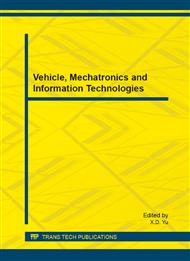p.417
p.421
p.425
p.430
p.435
p.441
p.446
p.450
p.455
Fuzzy Adaptive Control of a Chinese Medicine Sugar Precipitation Process
Abstract:
This paper illustrates the benefits of a fuzzy adaptive control approach applied to a Chinese medicine sugar precipitation process. A model dedicated to Chinese medicine sugar precipitation was designed, without consideration of crystal size distribution. Fuzzy adaptive robust control algorithm was proposed for the uncertain nonlinear systems. The on-line calculation amount of fuzzy logic system is relatively less, the convergence rate and accuracy are better, and the output of system tracks the setpoints well, even in presence of disturbances and modeling error. The algorithm was applied to the precipitation control of sucrose-glucose mixed solution. Simulation results supported the validity of the proposed algorithm.
Info:
Periodical:
Pages:
435-440
Citation:
Online since:
August 2013
Authors:
Price:
Сopyright:
© 2013 Trans Tech Publications Ltd. All Rights Reserved
Share:
Citation:


